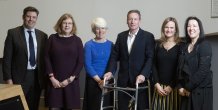News archive

From left: Mike Shore-Nye, Registrar, Emma Loosley, Jo Gill, Professor of English and Pro-Vice-Chancellor of the College of Humanities, Frank Gardner, Sally Faulkner and Janice Kaye, Provost
BBC Security Correspondent Frank Gardner highlights importance of learning languages
Esteemed BBC journalist Frank Gardner highlighted the importance of learning languages and shared his expertise on the complexities of Middle East politics during a special event at the University of Exeter.
The Security Correspondent told the audience, which included many local school children, how being able to communicate with others in another tongue would bring them new friends and opportunities.
Mr Gardner, an Arabic speaker and University of Exeter alumni, first became interested in learning and speaking languages at school. Being multilingual has helped him report around the world, from Afghanistan to Colombia and the Arctic.
He spoke at the event, Languages in a Global World, which is held annually and brings together members of the public, local modern foreign language teachers and their GCSE and A-level students, local University of Exeter alumni, and current staff and students of languages and international cultures at the University.
Mr Gardner told the audience he felt lucky to have travelled so widely in the Middle East before the current crisis across the region, and how he had witnessed how the events of 9/11 had made it a less hospitable place in some areas at times for Western travellers.
He said: “At first I thought the Arab Spring would be a breath of fresh air, it would lead to accountable transparent government, independent justices and a free press. But the issues people were protesting about are still there, they’ve just been bottled up.”
Mr Gardner said there was no easy for solution for how the West intervened in the Middle East as several different approaches – intervention, invasion and no action – had all proved to be disastrous.
“There is no blueprint or catch-all solution. People in the Middle East are now just saying leave us alone,” he said. “There is so much underused talent in the Middle East, but people are being held back by bad governance.”
When asked about the most interesting moment he had spoken Arabic, Mr Gardner said it was when working in Yemen covering kidnapping. He used the language to stay safe, and follow clearly the conversations of those around him.
He told the young people they would “miss so much” without having languages while working or travelling abroad. His tip for them was to learn holding phrases to allow them to pause and think in the middle of conversations if they were struggling to communicate.
Mr Gardner told the audience how much he had enjoyed his time at Exeter; even if he was initially reluctant, he ended up loving studying Arabic poetry. On his year abroad as part of his Arabic degree in Egypt, he enjoyed exploring and sketching in medieval Cairo.
He told the audience being able to listen was one of the most important skills he had learned, and advised them to decide what it is they are interested in, be available and demonstrate their interest through coming up with ideas or getting work experience.
The discussion, guided by Professor Emma Loosley, from the Department of Theology and Religion, covered his career, interest in languages and the major world events he has covered.
The event was chaired by Professor Sally Faulkner, Professor of Hispanic Studies and Film Studies in the College of Humanities and Assistant Deputy Vice Chancellor for Europe at the University.
Mr Gardner was awarded an OBE by HM The Queen in 2005 and is now the author of four bestselling books ‘Blood and Sand‘, describing his Middle East experiences and ‘Far Horizons‘ describing unusual journeys to unusual places and Crisis, his debut spy thriller set in Colombia.
Date: 20 January 2020
